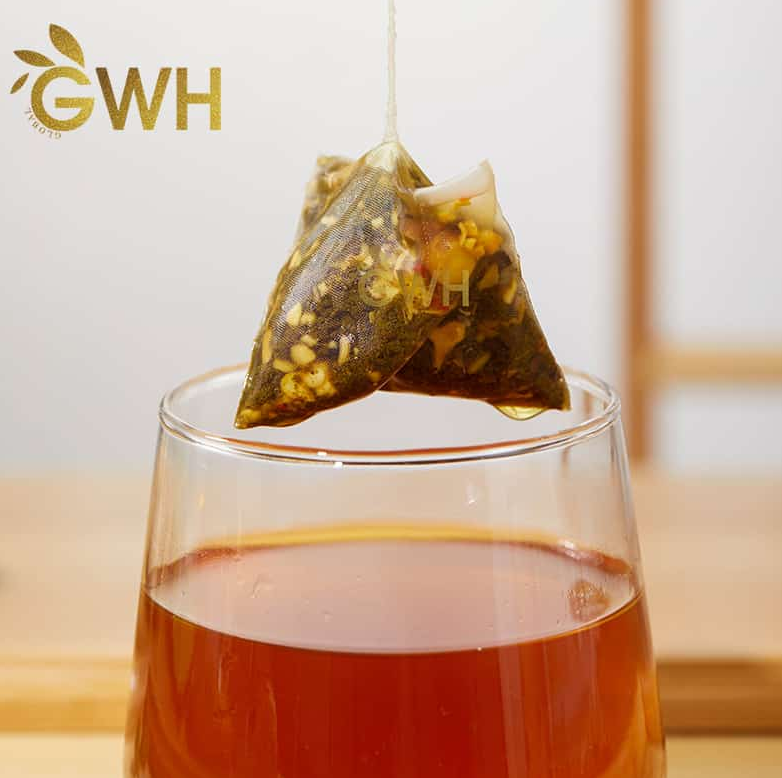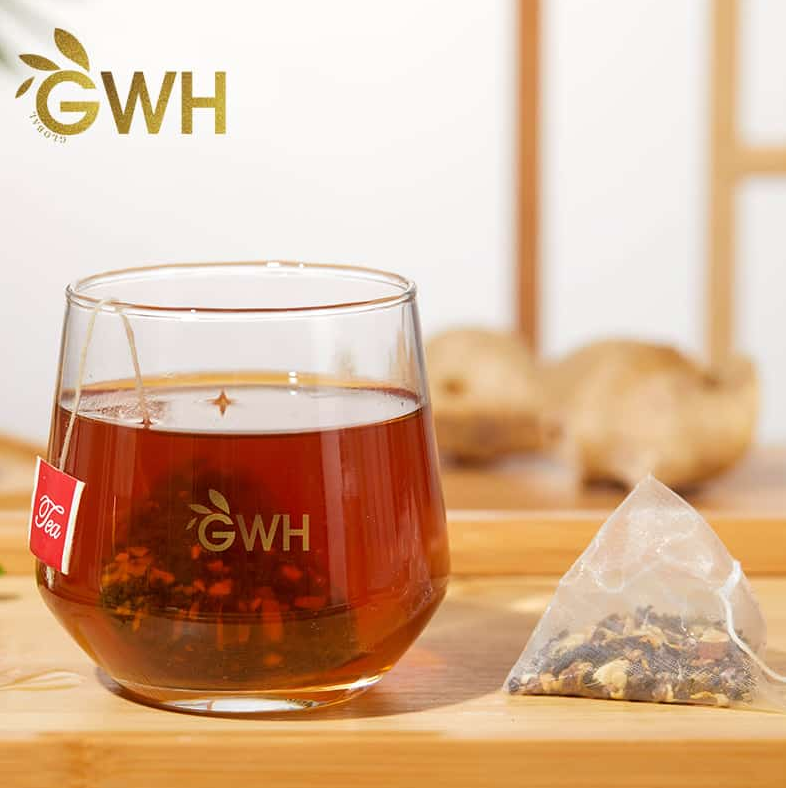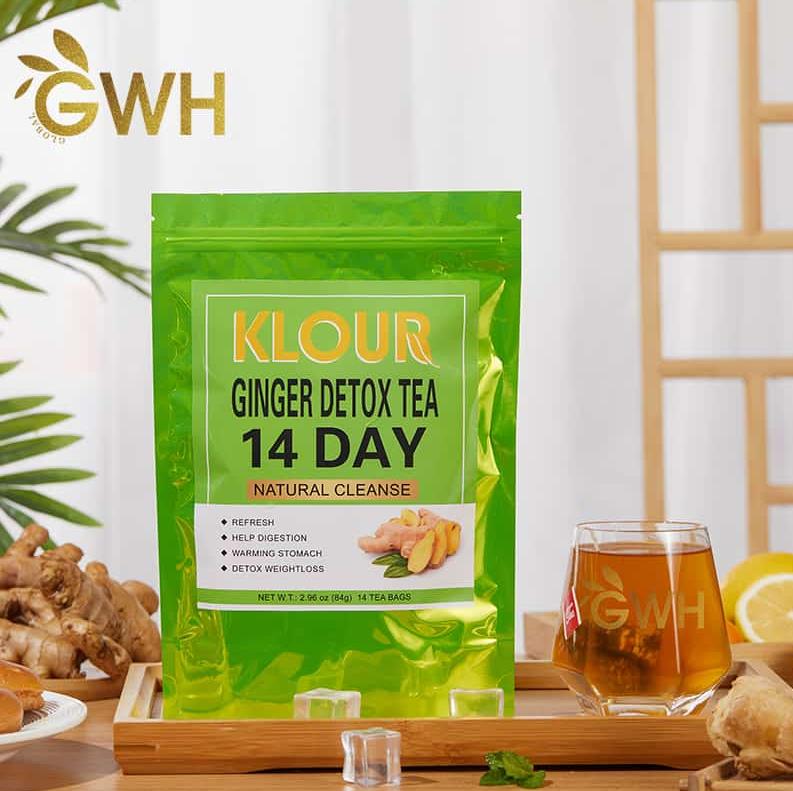Detox Tea Bloating: Ginger Herbal Tea 2024, supplied by GWH, is an innovative blend crafted to promote digestive health and reduce bloating. This premium tea combines the natural potency of ginger, lotus leaf, senna leaf, fennel, cinnamon, and hawthorn, each selected for its unique health benefits. Ginger, renowned for its anti-inflammatory properties, aids digestion, while lotus leaf and senna leaf support detoxification and gentle cleansing. Fennel and cinnamon enhance the flavor while contributing to digestive comfort, and hawthorn provides antioxidant support for overall wellness. This holistic blend has garnered positive feedback for its effectiveness and pleasant taste, making it a favored choice among health-conscious consumers seeking natural solutions for digestive issues.

The Evolution of Tea Culture in the United States
Tea culture in the United States has undergone a significant transformation over the past few decades. Initially, tea was viewed primarily as a quaint tradition, overshadowed by the more dominant coffee culture. However, recent years have witnessed a resurgence in tea’s popularity, driven by a growing awareness of its health benefits and a cultural shift towards wellness and mindfulness.
Historical Context
Historically, tea in America has its roots in colonial times, with the infamous Boston Tea Party marking a significant moment in both American history and tea culture. For a long time, tea was considered an elite beverage, mainly consumed by the upper classes. Over the centuries, the perception of tea has evolved, becoming more accessible and diverse.
Modern Tea Consumption
In contemporary America, tea is enjoyed by a wide demographic, transcending age, gender, and socio-economic status. This democratization of tea has led to an explosion of varieties available in the market, ranging from traditional black and green teas to more exotic herbal blends like ginger herbal tea. The modern tea consumer is more informed and adventurous, seeking out teas not just for their flavor but also for their health benefits.
The Rise of Herbal Teas
Herbal teas, in particular, have gained prominence due to their perceived health benefits. Ginger herbal tea, with its detoxifying properties, is a prime example. Consumers are increasingly turning to these teas as part of their wellness routines, looking for natural ways to boost their health and well-being. This shift has paved the way for the introduction of specialized teas like Detox Tea Bloating: Ginger Herbal Tea.
The Scale of the U.S. Tea Market
The U.S. tea market has expanded significantly, reflecting the growing consumer interest and demand. This market is characterized by its diversity and dynamism, offering a wide range of products catering to different tastes and preferences.
Market Size and Growth
As of 2024, the U.S. tea market is valued at several billion dollars, with a steady growth rate over the past decade. This growth is driven by increasing consumer awareness of the health benefits of tea, coupled with a broader trend towards natural and organic products. The market is expected to continue its upward trajectory, fueled by innovative products and marketing strategies.
Key Players and Brands
The market is dominated by several key players, including both established brands and new entrants. Companies like GWH, a supplier of Detox Tea Bloating: Ginger Herbal Tea, have carved out a niche by focusing on the health and wellness segment. These companies are constantly innovating, introducing new blends and formulations to meet the evolving needs of consumers.
Consumer Demographics
The demographic profile of tea consumers in the U.S. is broad, encompassing all age groups. However, there is a notable concentration of tea drinkers among millennials and health-conscious individuals. These consumers are more likely to experiment with different types of tea and are particularly drawn to those with specific health benefits, such as detox teas.
U.S. Tea Import Trends
The U.S. is a major importer of tea, sourcing products from various parts of the world to satisfy its diverse market. The import trends reflect both the demand for traditional teas and the growing interest in specialty and herbal teas.
Major Source Countries
The primary sources of imported tea include countries like China, India, Sri Lanka, and Kenya. These countries are known for their high-quality tea production and have established strong trade relationships with the U.S. The variety of teas imported from these regions ensures that American consumers have access to a wide range of flavors and types.
Import Volume and Value
The volume and value of tea imports have seen a steady increase, aligning with the growing market size. The U.S. imports millions of pounds of tea annually, with a significant portion being herbal and specialty teas. This trend highlights the increasing consumer preference for unique and health-oriented tea blends.
Impact on Local Market
The influx of imported teas has a considerable impact on the local market, driving competition and innovation. Local suppliers like GWH have leveraged this by introducing products that combine the best of imported ingredients with local preferences. Detox Tea Bloating: Ginger Herbal Tea, for instance, incorporates ingredients sourced from different parts of the world to create a unique blend that appeals to health-conscious consumers.
Preferences in Tea Consumption
American tea consumption preferences have evolved, with a noticeable shift towards health and wellness-oriented products. This change is reflected in the growing popularity of herbal teas, including detox and digestive blends.
Health and Wellness Trend
The health and wellness trend has been a major driver of tea consumption in the U.S. Consumers are increasingly looking for beverages that offer functional benefits, such as improved digestion, detoxification, and stress relief. Ginger herbal tea, with its well-documented health benefits, fits perfectly into this trend, offering a natural solution for bloating and other digestive issues.
Flavor and Variety
Flavor preferences in the U.S. tea market are diverse, with consumers showing an affinity for both traditional and exotic flavors. Herbal teas like ginger herbal tea are particularly popular due to their refreshing taste and health benefits. The combination of ginger with other ingredients like lotus leaf, senna leaf, fennel, cinnamon, and hawthorn creates a unique flavor profile that appeals to a wide audience.
Convenience and Accessibility
Convenience is another key factor influencing tea consumption. Ready-to-drink teas, tea bags, and other convenient formats have made it easier for consumers to enjoy their favorite teas on the go. This convenience, coupled with the availability of a wide range of products in supermarkets and online, has made tea more accessible than ever.
Future Prospects of the U.S. Tea Market
The future of the U.S. tea market looks promising, with several trends and factors expected to drive growth and innovation in the coming years.

Continued Growth in Health and Wellness Segment
The health and wellness segment is expected to continue its strong growth, driven by increasing consumer awareness and demand for natural and functional products. Companies like GWH are well-positioned to capitalize on this trend by offering products like Detox Tea Bloating: Ginger Herbal Tea, which cater to the specific health needs of consumers.
Innovation and Product Development
Innovation will play a crucial role in the future of the U.S. tea market. Companies are likely to continue experimenting with new ingredients, flavors, and formulations to meet the evolving preferences of consumers. The use of advanced technology and research to develop teas with enhanced health benefits will also be a key focus area.
Expansion of Distribution Channels
The expansion of distribution channels, including online platforms, specialty stores, and supermarkets, will further drive market growth. Online sales, in particular, are expected to see significant growth as consumers increasingly prefer the convenience of shopping from home. This will also provide an opportunity for niche brands and products to reach a wider audience.
Sustainability and Ethical Sourcing
Sustainability and ethical sourcing will become increasingly important as consumers become more conscious of the environmental and social impact of their purchases. Companies that prioritize sustainable practices and transparent sourcing will likely gain a competitive edge in the market.
Detox Tea Bloating: Ginger Herbal Tea by GWH
One of the standout products in the current market is Detox Tea Bloating: Ginger Herbal Tea by GWH. This tea has been specifically formulated to address common digestive issues and promote overall wellness.
Ingredients and Benefits
The key ingredients in this tea include ginger, lotus leaf, senna leaf, fennel, cinnamon, and hawthorn. Each ingredient has been carefully selected for its unique health benefits:
Ginger: Known for its anti-inflammatory and digestive properties, ginger helps reduce bloating and improves digestion.
Lotus Leaf: Traditionally used in herbal medicine, lotus leaf aids in detoxification and weight loss.
Senna Leaf: A natural laxative, senna leaf helps relieve constipation and cleanse the digestive system.
Fennel: Fennel seeds are known to reduce bloating and gas, promoting a healthy digestive tract.
Cinnamon: This spice not only adds flavor but also has anti-inflammatory and antioxidant properties.
Hawthorn: Rich in antioxidants, hawthorn supports cardiovascular health and digestion.
Consumer Reception
Detox Tea Bloating: Ginger Herbal Tea has received positive feedback from consumers who appreciate its effectiveness and pleasant taste. Many users report a noticeable reduction in bloating and improved digestion after regular consumption. The tea’s natural ingredients and health benefits make it a popular choice among health-conscious individuals.
Market Position
GWH has positioned this tea as a premium product in the health and wellness segment. By focusing on quality ingredients and effective formulations, GWH has managed to create a loyal customer base. The brand’s commitment to transparency and sustainability further enhances its appeal to modern consumers.

Conclusion
The U.S. tea market is in a state of vibrant growth and transformation. With a rich history and evolving consumer preferences, the market offers ample opportunities for innovation and expansion. Detox Tea Bloating: Ginger Herbal Tea by GWH exemplifies the trend towards health-oriented products, combining traditional ingredients with modern health benefits. As the market continues to evolve, products like these are set to play a crucial role in shaping the future of tea consumption in America.


